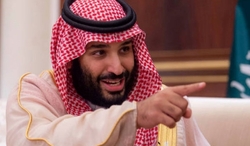 Saudi Crown Prince Mohammad bin Salman (MbS) banned dissident princes with questionable loyalties from travelling abroad and restricted their access to financial services, according to an Arabic media report.
Saudi Crown Prince Mohammad bin Salman (MbS) banned dissident princes with questionable loyalties from travelling abroad and restricted their access to financial services, according to an Arabic media report. RNA - Al-Quds al-Arabi, citing sources, reported on Thursday that the new measures restrict mobility to dissident princes, including the right to obtain a passport and travel abroad without certain guarantees or a special permission of MbS, the de facto ruler of the kingdom.
The Saudi princes, who previously enjoyed diplomatic privileges and were frequent travelers to Western countries, are now also barred from conducting foreign exchange transactions and cannot send or receive foreign currency remittances, it added.
“The number of Saudi princes who sold their precious properties abroad in the wake of travel restrictions and banking problems has increased. On the other hand, Saudi princes' stay at luxury European hotels in summer 2018 and 2019 as compared to previous years has declined,” the report said.
In recent years, dozens of princes, ministers and former ministers have been detained on the order of Saudi Arabia’s so-called Anti-Corruption Committee headed by the crown prince in a crackdown which is widely believed to be aimed at consolidating his power.
The detained individuals have faced allegations of money laundering, bribery, extorting officials and misappropriation of public funds for personal benefits.
In late 2017, Saudi authorities started negotiating settlements with individuals held over allegations of corruption at the Ritz-Carlton Hotel in Riyadh.
Prince al-Waleed bin Talal bin Abdulaziz, the chairman of investment firm Kingdom Holding Company, Nasser bin Aqeel al-Tayyar, the founder of Al Tayyar Travel Group, and Amr al-Dabbagh, the chairman of builder Red Sea International, were among the top business executives detained during the purge.
The settlements came at a time when Saudi King Salman planned to relinquish power in favor of his son who is pursuing a self-promotion campaign under the cover of tackling high-level corruption.
Pundits believe the targeting of Saudi Arabia’s long-standing elite represents a shift from family rule to a more authoritarian style of governance based on a single man.
Saudi’s ongoing deadly military campaign against neighboring Yemen and Jamal Khashoggi's murder, a columnist for The Washington Post and an outspoken critic of Saudi Arabia's ruling family, have shattered the dreams of bin Salman for building a modern and economically vibrant country.
Many also see Riyadh’s policies as a major cause of the crises unfolding in the region.
MbS has stated that he bears responsibility for the killing of Khashoggi last year by Saudi operatives "because it happened under my watch", according to a PBS documentary to be broadcast next week.
MbS has not spoken publicly about the killing inside the Saudi consulate in Turkey. The CIA and some Western governments have stated that he ordered it, but Saudi officials say he had no role.
The death sparked a global uproar, tarnishing the crown prince's image and imperilling ambitious plans to diversify the economy of the world's top oil exporter and open up Saudi society. He has not since visited the United States or Europe.
After initial denials, the official Saudi narrative blamed the murder on rogue operatives. The public prosecutor said the then-deputy intelligence chief ordered the repatriation of Khashoggi, a royal insider who became an outspoken critic, but the lead negotiator ordered him killed after discussions for his return failed.
Asked how the killing could happen without him knowing about it, PBS' Martin Smith quotes MbS as saying, "We have 20 million people. We have three million government employees."
Smith asked whether the killers could have taken private government jets, to which the crown prince responded, "I have officials, ministers to follow things, and they're responsible. They have the authority to do that."
A senior US administration official told Reuters in June the administration of US President Donald Trump was pressing Riyadh for "tangible progress" towards holding to account those behind the killing ahead.
Eleven Saudi suspects have been put on trial in secretive proceedings but only a few hearings have been held.
A UN report has called for MbS and other senior Saudi officials to be investigated.
Khashoggi was last seen at Riyadh consulate in Istanbul on October 2, where he was to receive papers ahead of his wedding. His body was reportedly dismembered and removed from the building, and his remains have not been found.
847/940